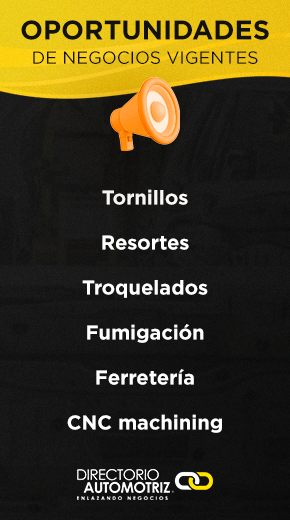What is Die Casting?
Let's start by defining the Die Casting process; this is one
of the lower-cost and fastest industrial processes for the formation of
materials. The production advantages lie in its ability to produce hundreds of
thousands of castings relatively quickly using a single mold. All components
made using this process are of uniform quality and involve relatively low unit
costs. It should be noted that 63% of the Die Casting parts produced in Mexico
are for the automotive industry, of which 54% are used in the domestic market
and the rest are exported to the United States, Germany, Japan, South Korea,
Central America and Europe.

Die Casting in Mexico
Mexico is the tenth largest manufacturer of die-casting parts
in the world, producing for the automotive, aerospace, telecommunications,
electronic, electrical, architecture and decoration, consumer products and home
appliance industries; the companies dedicated to this process generate around
350 thousand jobs in more than 100 plants located in the country. Since 2011,
the Mexican aluminum industry experienced a compound annual growth rate (CAGR)
of 13% and just from 2010 to 2016, 26 new smelting plants were built in Mexico.
As of 2020, die-casting accounted for approximately 80% of
automotive parts produced in Mexico, adding $7 billion to gross domestic
product (GDP). Mexican die-casting is currently expected to grow in a CAGR of
over 6% through 2025, thanks to demand from mold and tool makers, machine builders
and die-casting lines.

The need for Die-Casting and new technologies
Environmental Protection Agency (EPA) goal to increase miles
per gallon (mpg) standards to 54.5 mpg by 2025 to reduce carbon dioxide
emissions from automobiles by increasing the fuel efficiency, are driving OEMs
to reduce the weight of their vehicles through the use of lightweight
non-ferrous metals. Automotive brands around the world are exploring new
technologies to help reduce emissions, and one of the solutions is the
ultra-high-vacuum die-casting process that is applied to produce large, thin
components, such as space frames and pillars, that are are welded to the
vehicle chassis, producing better automotive components than those made by
traditional die casting.
However, these products are quite large and require a die-casting
machine with a 2,500 to 4,000 metric tons of clamping force. This affects the
popularity of ultra-high vacuum die casting, making sudden change from one
traditional method to another not as feasible, however, this change will be
gradual and is expected to increase during the forecast period mentioned in
this article, around 2025.
Key companies in die-casting
The value of the Mexican Die Casting market by 2023 is
estimated to be 2 billion dollars, that is, 2.5% of the world market. On the
other hand, there will be an annual growth in 2023 for aluminum smelting of
7.4%, 12% for magnesium and 2% for zinc. While the markets where they will be
applied in their majority will be for structural components, engine parts and
transmission components. There is also business potential for Die Casting
tooling, machinery and supplies for this process.

In the aftermarket segment there are opportunities to cover
the needs of Die Casting services, since there are few providers that work in
this particular market. In addition, as the volume of auto parts, such as
engines and transmissions, that use Die Casting components increases, local
business opportunities will grow in the same proportion, since a significant
percentage of the commodity is still imported mainly from China, Japan, the
United States and Europe. To visualize this need, Directorio Automotriz published
a map that shows more than 121 die casting supply options with a presence in
more than 16 states.

An area of opportunity
The intelligence area of Directorio Automotriz reached the
same conclusion as Mordor Intelligence: the Mexican auto parts die casting
market still needs to develop in the medium tonnage segment, since there is
sufficiency in high and low tonnages. The largest die-casting companies choose
their projects with OEM or Tier 1 companies, while the low-tonnage ones, which
manufacture smaller parts and are often very small companies, tend to have
limited capacities, insufficient machinery and equipment, as well as little
government support to grow.
At the same time, the analysis of the market by the Directorio
Automotriz team shows a certain lack of interest on the part of assemblers and
Tier 1 companies to develop more Die Casting suppliers in Mexico, resorting to
the classic players that are recognized companies with extensive experience,
which guarantee smooth production without significant additional investment.

It remains clear that the market growth in volume and
investments in aluminum itself will force OEMs to focus on improving their
suppliers. Proof of this are investments such as that of LeBélier in San Miguel
de Allende, Guanajuato, which will allow the growth of the supply of this
process.
Die Casting is a solution that will be necessary for the
transition to electric mobility, so OEMs and Tier 1 companies must prepare
their national suppliers to respond to the requirements as soon as the
transition is a reality (which it already is) and not just remain in
expectation for another five years. The best thing that can be done is to
continue developing die-casting suppliers in Mexico to continue catapulting it
worldwide as a leading country in this process.
Sources:
The
Current State of Die Casting in Mexico and the USA
Mexico:
The Boom of the Automotive Industry Drives the Die-Casting Market
What
is Die Casting? Development, Processes and Materials in Die Casting
Global
Aluminum Castings Market Outlook to 2024: Developing Economies Continue to
Spearhead Growth









